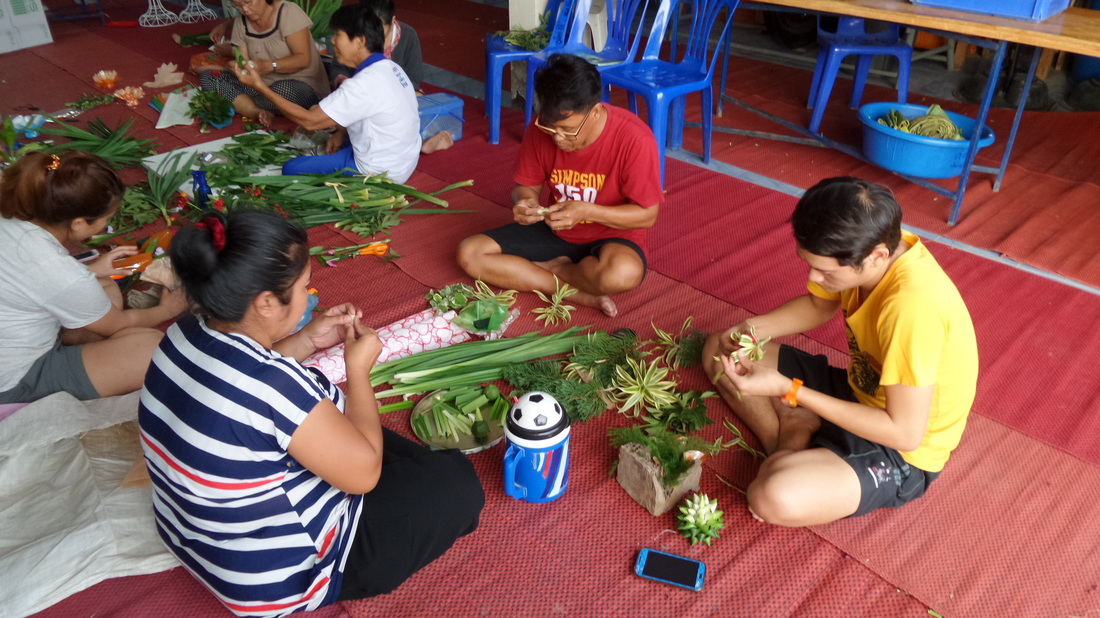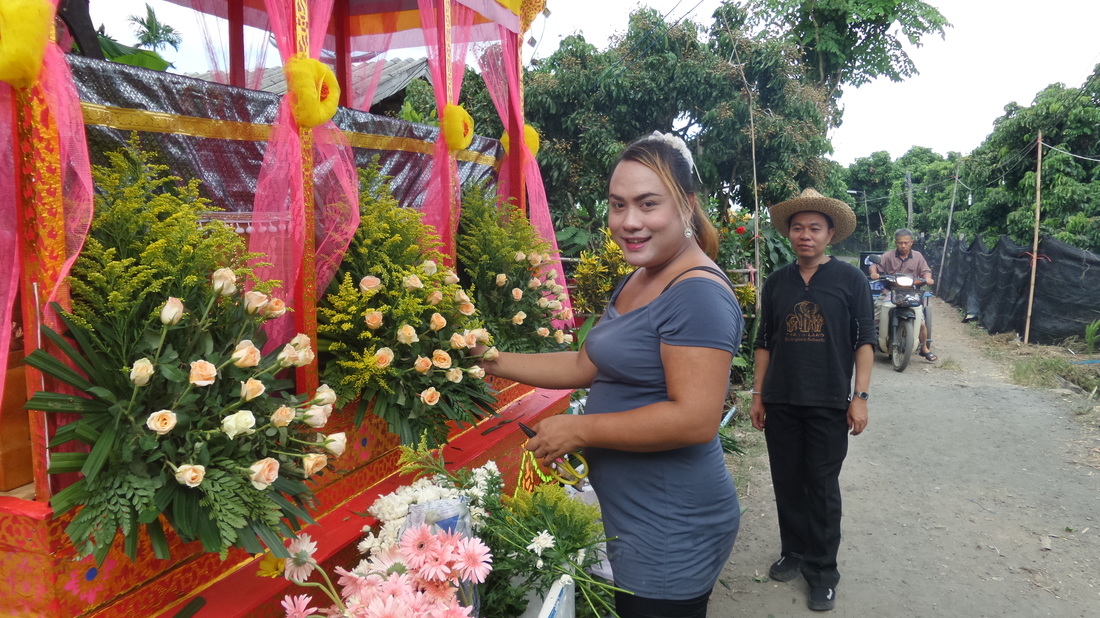|
Thai style flower arranging was the subject of a workshop last week in our village, conducted by the Continuing Education Department of the regional office of the Ministry of Education. Each night for a week, Kru Prajorn came and sat on the floor of the village hall surrounded by enthusiastic folks who were improving their skills in cutting, folding, pinning, and assembling leaves and blossoms into configurations the flowers would never have gotten into on their own. [There is a certain arrogance involved in trying to do better than Mother Nature. But beauty is in the eye of the beholder, and to my eye the products each evening were lovely.]
As an uninitiated outside observer it seems to me that the basic theory of Thai flower arrangements is that the flowers should be much closer together and more portable than in nature. Some classical arrangements like puang malai พวงมาลัย , malai pra-korn มาลัยพระกรand bai sri (see www.kendobson.asia/blog/calling-for-kwan) are complicated traditional assemblies of dissected and folded petals and buds attached to intricately plaited leaves. There are also traditional and modern ways of arranging flowers for funerals, ordinations, table decorations, over doorways on special occasions, and even as head-dresses. No graduation ceremony or hotel wedding would be complete without the stage being laden with floral ropes and cascades. Thailand sells trainloads of flowers every day. Flowers are an important cash crop. In our village almost every house, no matter how small and modest, has some flowers and flowering bushes growing. Some, like jasmine and gardenias, are known for their aroma; others, like orchids and countless strains of daisies, for their color and durability. Then, too, some flowers are chosen for their auspicious names, most often hinting at prosperity and good fortune. Whereas, others with inauspicious names are avoided or viewed with alarm if they should show up on their own. Flower fanciers can tell you the inherent significance of many flowers, this one assuming an attitude of humility, that one inspiring courage, another displaying perseverance. The purpose of the workshop was supposedly to teach basic techniques for students to save money by producing their own arrangements rather than buying them. This fits in the “Sufficiency Economy Philosophy” introduced a couple of decades ago by HM the King. The idea is that people can sustain and improve their quality of life without a lot of expense. Consistent with that, Kru Prajorn used home-grown plants and flowers as well as a few vegetables and recycled plastic bottles. Although the workshop was announced as an income-supplement possibility, it was too short to develop a marketable level of products. Instead, it served a much more current purpose, introducing a leisure time activity. We live in a transitional era in village culture. People have more money to spend and more free time than their ancestors ever had; but time is the most valuable thing in the unfolding era. We may say that money was not valuable in the era of self-sufficiency now past, because village people did not have any. At that time flowers were symbols, often with supernatural significance. In the era now passing, money is very valuable, carefully acquired and carefully spent with few luxuries. For village people in this era, flowers imitate ostentation rather than indicating actual wealth. In the era beginning now, people know the difference between expensive flowers and inexpensive ones. What flowers are beginning to signify now is social status. Cultivation of flowers is a status statement. (Of course, a basic motive for growing flowers is personal satisfaction.) The thing of most value in the lives of people of the younger two generations is leisure. People today willingly sacrifice money to buy conveniences that shorten time spent on necessary chores like food preparation, so they can have more leisure time. Indeed, some now have enough free time that they can spend it learning flower arrangement – or writing essays on village life.
0 Comments
Leave a Reply. |
AuthorRev. Dr. Kenneth Dobson posts his weekly reflections on this blog. Archives
March 2024
Categories |
| Ken Dobson's Queer Ruminations from Thailand |
|


 RSS Feed
RSS Feed
